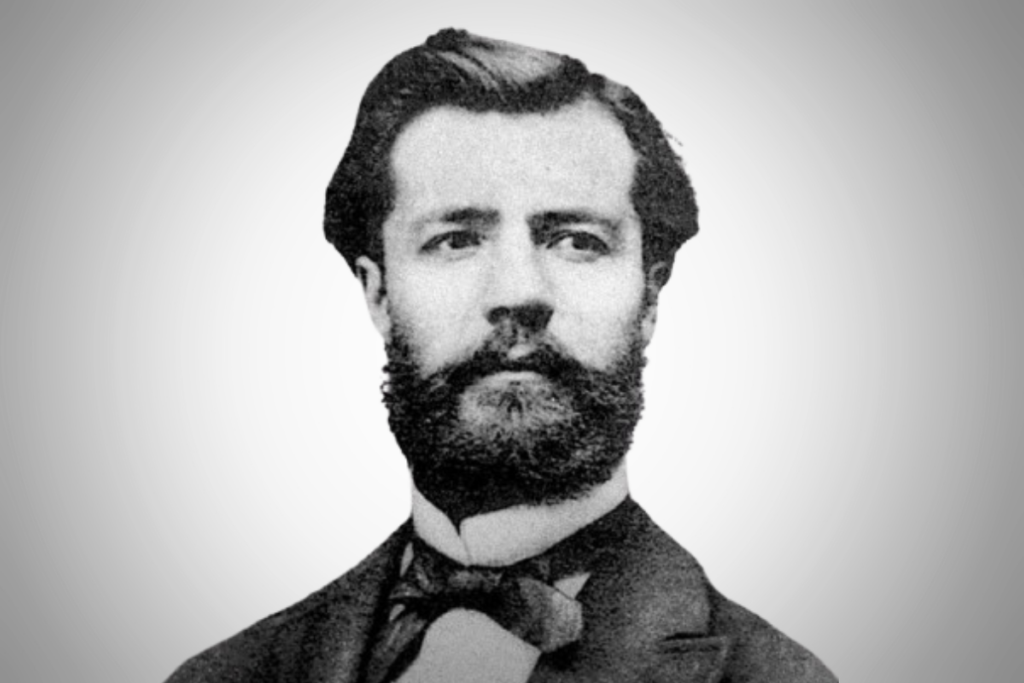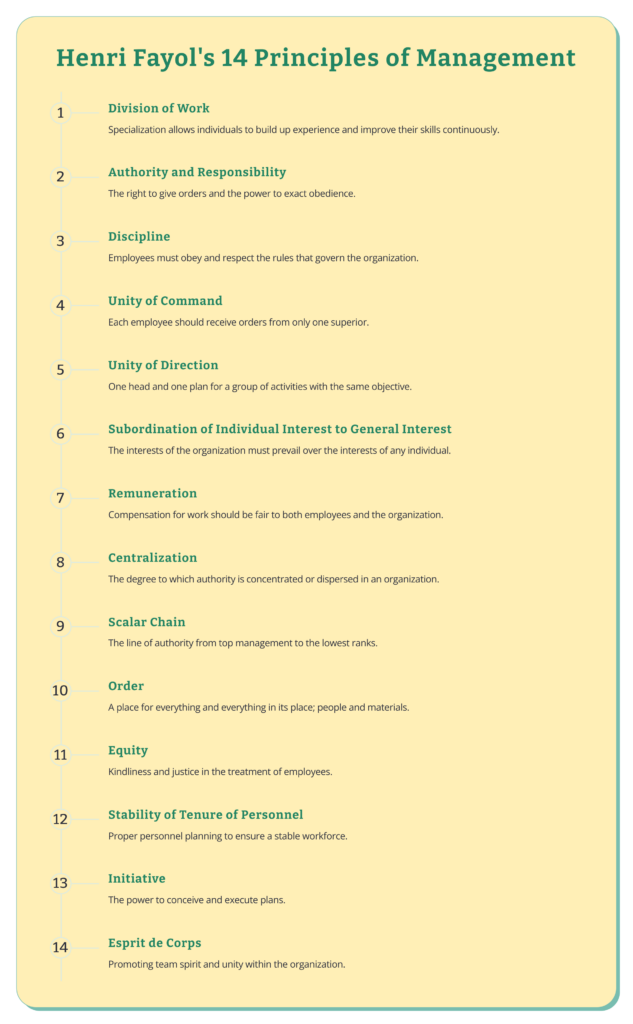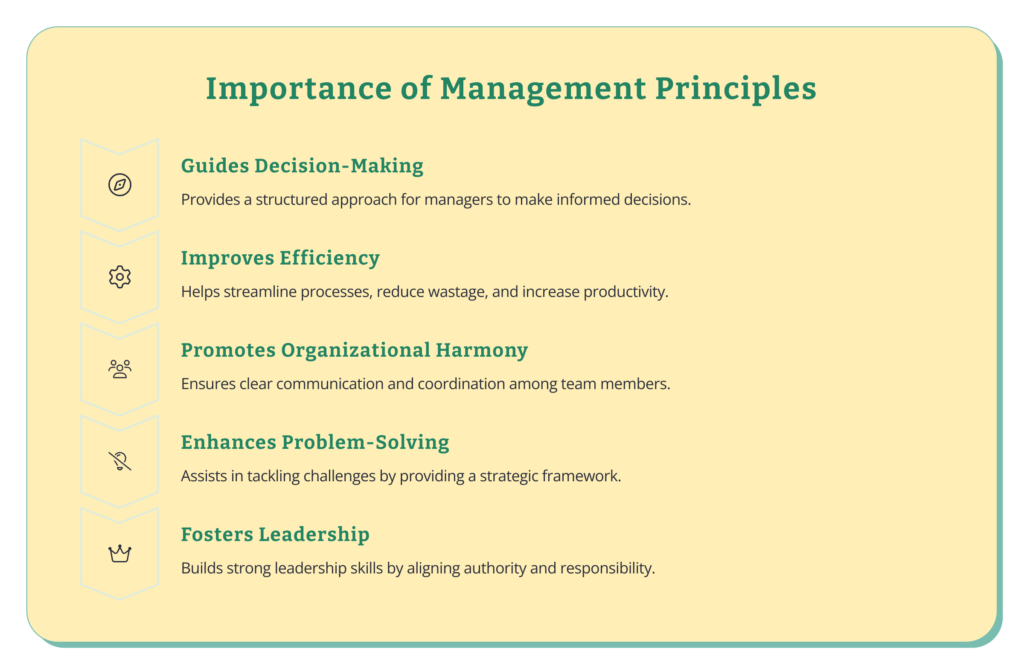

Quick Summary
Businesses thrive on the “principles of management,” which guide how people and processes work together efficiently. Henri Fayol’s influential work, Administration Industrielle et Générale, highlights the importance of administrative skills over technical expertise, shaping modern management theory.
These principles help businesses make decisions, structure work, and solve problems. By following these guidelines, companies can improve productivity, streamline operations, and navigate challenges effectively. Real-world examples show how these concepts lead to success in practice.

Henri Fayol was a distinguished French mining engineer who significantly contributed to management. He began his career at the French mining company Commentry-Fourchambault and Decazeville, where he quickly rose through the ranks due to his exceptional skills and leadership qualities. Eventually, Fayol became the general manager and director of the company, a position that allowed him to implement and refine his management theories.
Known as the “Father of Modern Management Theory,” Fayol’s work was groundbreaking in the early 20th century. His principles of management provided a structured approach to managing organizations, which was revolutionary at the time. Fayol’s ideas were not just theoretical; they were practical guidelines that could be applied across various industries, making them highly influential in modern management practices.
Fayol’s principles of management are crucial because they offer a foundational framework for effective management practices. These versatile principles can be applied in different organizational contexts, from small businesses to large corporations. By understanding and implementing Fayol’s principles, managers can address common challenges more effectively, improving organizational efficiency and communication.
For instance, Fayol’s principle of division of work helps optimize employee productivity by assigning tasks based on individual expertise. His emphasis on authority and responsibility ensures that employees are empowered to make decisions while being accountable for their actions. These principles collectively contribute to a more organized, efficient, and harmonious workplace, essential for achieving business goals.
Management principles are the rules that help you lead a team or run a business smoothly. They are super important because they give you a clear path to follow when making decisions and organizing your work. Henri Fayol’s principles, also known as Fayol’s, are foundational, providing a structured approach to planning, organizing, and controlling. Here’s how these principles shape the way a company operates:
Henry Fayol laid a strong foundation for management by providing 14 principles. His insights led to the creation of the Principles of Management book, a foundational text that details 14 key principles essential for effective management. These principles explain the principles of management and illuminate their functions, helping businesses achieve their goals efficiently. Let’s explore each principle with a detailed explanation and real-life examples.

What it means: Specialize tasks among people to increase efficiency.
Example: In a factory, one person operates machinery while another assembles parts. This specialization makes workers skilled at specific tasks, leading to faster production and fewer mistakes.
Why it’s essential: Specialization maximizes productivity and expertise, making the work process smoother and more efficient.
What it means: With power comes the obligation to achieve tasks effectively.
Example: A restaurant manager has the authority to set shifts but is also responsible for covering absences to ensure the restaurant operates smoothly.
Why it’s essential: Balancing authority with responsibility ensures leaders are accountable, fostering a responsible management culture.
What it means: All must respect and follow rules and agreements.
Example: Employees adhering to a company’s time management policies, like clocking in and out, promotes fairness and order within the workplace.
Why it’s essential: Discipline maintains order, ensures fairness across the board, and upholds the integrity of organizational processes.
What it means: An employee should receive orders from one superior only.
Example: A marketing team member reports only to the marketing head, avoiding confusion and conflicting instructions from multiple leaders.
Why it’s essential: This clarity in command prevents confusion and conflicting instructions, enhancing decision-making and accountability.
What it means: Teams with the same objective should be directed by a single plan and leader.
Example: One sales manager drives all sales activities and ensures the team’s efforts align with the company’s sales targets.
Why it’s essential: It ensures that all efforts are strategically aligned, maximizing cohesion and efficiency in achieving organizational goals.
What it means: The company’s general interest should come before the individual interest when at work, prioritizing organizational goals over personal desires.
Example: A team member passes up a personal opportunity for training during a critical project phase to ensure team success.
Why it’s essential: It promotes teamwork and alignment with the company’s goals, ensuring that personal goals do not derail the organizational objectives.
What it means: Workers must be fairly paid for their services to motivate and sustain them.
Example: A commission model in sales not only incentivizes greater sales volume but also compensates salespeople for their direct contribution to the company’s revenue.
Why it’s essential: Fair compensation reduces employee turnover and boosts morale, directly impacting productivity and satisfaction.
What it means: The extent to which decisions are taken from the top or delegated to lower levels.
Example: A small business owner makes all the key decisions, ensuring consistency and clarity, but may delegate daily operational decisions to trusted managers.
Why it’s essential: Balancing centralization and decentralization helps in quick decision-making while also empowering employees.
What it means: A clear line of authority from top management to the lowest ranks.
Example: A customer service issue being escalated through defined levels of management to ensure the appropriate authority resolves it.
Why it’s essential: Ensures clarity in command and communication, making the organizational structure clear and functional.
What it means: Everything should have its place, and everyone should be in their place.
Example: In a retail store, products are organized categorically, and staff are assigned specific sections to manage.
Why it’s essential: Maintains organization and efficiency, making operations smooth and preventing chaos.
What it means: Employees should be treated kindly and justly.
Example: Addressing employee grievances impartially, ensuring no one feels undervalued or mistreated.
Why it’s essential: Builds organizational loyalty and trust, enhancing employee satisfaction and productivity.
What it means: High employee turnover should be avoided as it costs the company and disrupts operations. Emphasizing job security is crucial for employee retention and organizational efficiency.
Example: Offering career development and growth opportunities to retain talent and reduce recruitment costs.
Why it’s essential: Stability increases productivity as experienced employees are more efficient and knowledgeable about company processes.
What it means: Encouraging employees to take action and innovate.
Example: A tech company allows developers to spend time on personal projects that may benefit the company.
Why it’s essential: It nurtures creativity and innovation, leading to business growth and adaptation in a changing market.
What it means: Promoting team spirit and unity among employees.
Example: Team-building activities that create a sense of belonging and cooperation among team members.
Why it’s essential: It enhances morale and productivity, as employees work better when they feel connected and supported.
As Henry Fayol laid down, these principles outline essential managerial practices. They also provide a timeless guide that helps organizations function effectively, quickly adapt to changes, and achieve their objectives.

Applying Fayol’s principles of management in practice involves a deep understanding of each principle and tailoring them to meet the organization’s specific needs. Managers can use these principles as a framework for decision-making and problem-solving, adapting them to traditional and modern management practices.
For example, the principle of division of work can be effectively applied by assigning tasks to employees based on their skills and expertise, thereby enhancing productivity and reducing errors. The principle of authority and responsibility can be implemented by ensuring that employees have the necessary authority to complete their tasks and are held accountable for their performance. Similarly, the principle of discipline can be enforced by establishing clear rules and regulations and ensuring consistent adherence.
Managers can significantly improve job satisfaction and productivity by integrating 14 principles of Henry Fayol into daily operations. These principles promote a positive work culture, reduce stress and conflict, and enhance communication and decision-making. Additionally, they foster a sense of belonging and respect among employees, which is crucial for maintaining high levels of engagement and motivation.
50% of the managerial personnel don’t feel effective even after 1 year of job. Understanding key aspects of management principles makes any business work better and faster. These principles boost how well an organization functions by ensuring everyone is on the same page and knows what to do. Here’s how these principles make a difference:
Discipline is crucial in a management job as it fosters positive interrelations among team members and helps achieve project goals.
Here are some tangible ways principles of management help in different places:
By adhering to these management principles, every business or organization can work better, be more organized, and achieve its goals. It’s like knowing the rules of a game—playing becomes easier, and you often win.
Self-Management: The Secret to Success
Diploma in Business Management: Better than MBA?
Henri Fayol’s 14 Principles of Management provide a foundation for effective management. They include division of work for efficiency, authority with responsibility, discipline for order, unity of command to avoid conflicting instructions, and unity of direction for shared goals. Other principles include subordination of individual interests to organizational goals, fair remuneration, centralization of decision-making, a clear scalar chain, order, equity, stability of tenure, initiative, and esprit de corps for teamwork and morale.
Henry Fayol made a big impact on how we think about managing businesses. He introduced the Henry Fayol principle of management, which includes his 14 principles. Fayol believed that management could be taught, just like any other skill. His ideas helped shape modern management practices, making it easier for people to understand and apply them in real-life situations.
The core functions of management include planning, organizing, leading, and controlling. These functions help managers make sure everything in the business runs smoothly. When you explain the principles of management, you’ll see how these functions fit together to help achieve business goals. A good principle of management book will cover these in detail.
Principles of management are crucial because they provide a clear roadmap for running a business effectively. They help you make better decisions, organize work, and lead your team. When you know the principles of management, you can improve efficiency, boost morale, and achieve your business goals more easily.
You can learn and apply management principles by taking classes, reading books, and practicing in real-life situations. Start with the principle of management book. Then, try to use these principles in your daily tasks at work or school. The more you practice, the better you’ll get at managing and leading others.

Authored by, Amay Mathur | Senior Editor




Amay Mathur is a business news reporter at Chegg.com. He previously worked for PCMag, Business Insider, The Messenger, and ZDNET as a reporter and copyeditor. His areas of coverage encompass tech, business, strategy, finance, and even space. He is a Columbia University graduate.
Editor's Recommendations
Chegg India does not ask for money to offer any opportunity with the company. We request you to be vigilant before sharing your personal and financial information with any third party. Beware of fraudulent activities claiming affiliation with our company and promising monetary rewards or benefits. Chegg India shall not be responsible for any losses resulting from such activities.
Chegg India does not ask for money to offer any opportunity with the company. We request you to be vigilant before sharing your personal and financial information with any third party. Beware of fraudulent activities claiming affiliation with our company and promising monetary rewards or benefits. Chegg India shall not be responsible for any losses resulting from such activities.